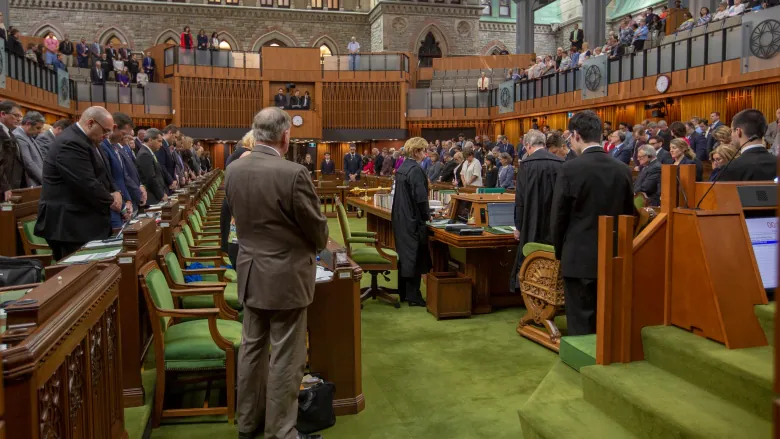May 10, 2022
-CBC
MPs are today debating a motion calling for an immediate end to the prayer reading that begins each sitting day in the House of Commons.
Bloc Québécois MP Martin Champoux sponsored the binding motion in the House. A vote on the motion will be held Wednesday, said a spokesperson for the government House leader’s office.
The motion, if it passes, would replace the prayer with a moment of reflection before the start of each day’s business. Other parties in the House have opposed the motion in debate, saying there are more pressing issues facing MPs.
The motion says that the prayer should be scrapped because the House “respects the beliefs and non-beliefs of all parliamentarians and of the general public and it is committed to the principle of the separation of religion and the state, the diversity of views and freedom of conscience while upholding the secularism and religious neutrality of the state and out of a desire for inclusiveness.”
The Speaker of the House of Commons reads the prayer every morning before the cameras in the chamber have been turned on, and before members of the public and media are allowed inside.
Parliament’s website says that the Speaker, MPs and table officers must stand during the prayer, which is followed by a moment of silence.
Though usually a closed-door affair, the prayer was televised on Oct. 23, 2014 — the day after the shooting at the National War Memorial and inside Parliament’s Centre Block.
The prayer reads:
“Almighty God, we give thanks for the great blessings which have been bestowed on Canada and its citizens, including the gifts of freedom, opportunity and peace that we enjoy. We pray for our sovereign, Queen Elizabeth, and the Governor General. Guide us in our deliberations as members of Parliament, and strengthen us in our awareness of our duties and responsibilities as members. Grant us wisdom, knowledge, and understanding to preserve the blessings of this country for the benefit of all and to make good laws and wise decisions. Amen.
The prayer has been part of the daily House proceedings since 1877 and was codified in standing orders in 1927.
In 2015, the Supreme Court of Canada ruled that a municipal council in the Quebec town of Saguenay could not continue to open its meetings with a prayer. The unanimous decision said reciting a Catholic prayer at council meetings infringed on freedom of conscience and religion.
Following the decision, Ottawa Mayor Jim Watson replaced the prayer at the beginning of city council meetings with a moment of reflection. Parliament is protected by parliamentary privilege and is able to set its own rules.
MPs have more pressing matters to think about: Holland
Prime Minister Justin Trudeau seemed cool to the idea as he went into a cabinet meeting in Ottawa on Tuesday morning.
“As I’ve spoken with Quebecers and people across the country, they’re focused on mobility, they’re focused on housing, they’re focused on the war in Ukraine,” Trudeau said. “That’s what we’re going to stay focused on and that’s what, frankly, most of the conversations in the House are all about.”
Government House leader Mark Holland said the House of Commons has a debate every June about the standing orders in the House and that would have been a better time for the Bloc to have raised the issue.
“I think it’s strange that the Bloc would choose one of their three opposition days — they only get three a year — to deal with this when we already have a day set aside to deal with standing orders,” he said.
Holland said the House should be dealing with more pressing issues, such as the pandemic, housing and the war in Ukraine.
New Democrat MP Daniel Blaikie told reporters an opposition day motion that provides just 24 hours’ notice isn’t the best way to “foster the right dialogue” about ending the prayer, which he said should be broader in scope.
“I know New Democrats have often felt, if we’re going to talk about changing the opening ceremony for Parliament, that we ought to have a land acknowledgement as part of that opening ceremony,” he said.
Blaikie said that while the motion is a worthwhile effort, there other ways to have that discussion.
“They’ve proposed one, they’ve proposed it with very little short notice and not a lot of consultation in advance, and I do question, personally, whether that’s the right way to go about it,” he said.
NDP caucus chair Jenny Kwan said her caucus would discuss the motion and she did not want to prejudice their decision by suggesting how they might vote.
Conservatives say prayer not a pressing issue
Conservative MP Cathy Wagantall told the House earlier today that while she appreciates the opportunity to discuss vital issues that spark disagreement among MPs, the prayer isn’t one of them.
“To me and my constituents, it is offensive that the Bloc does not enter the House until after the national anthem … is sung, because they openly indicate that their purpose is to separate from Canada,” she said. “And yet, I and all members respect the reality that this is their choice in this place.”
Gérard Deltell, the Conservative MP representing Louis-Saint-Laurent in Quebec, told the House that the job of MPs is to address critical issues facing Canadians.
“Maybe I’m wrong, but I think in my riding people are more concerned about inflation, about housing, about affordability. Those are issues that are very concerning to all Canadians,” he said.
“I’m not quite sure that the prayer that we have to say here in the House of Commons off-camera is very important for our people that we represent.”




